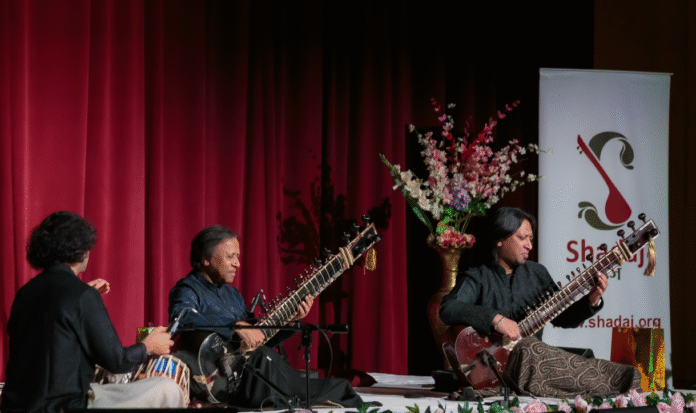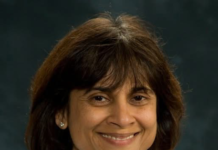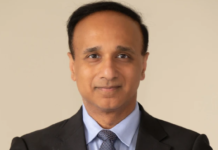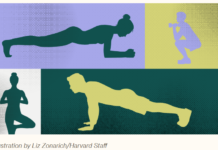BOSTON–In a world that often races toward the new, Shadaj has carved out a rare and essential space for the timeless. As the recipient of the Art & Culture Visionary Award at the 2025 New England Choice Awards, Shadaj is being recognized for its remarkable commitment to preserving and elevating Indian Classical Music—not just as an art form, but as a living, breathing experience that connects past to present, and tradition to innovation.
Founded in 2015 by Rajesh Godbole, a technology leader by profession and a music lover at heart, Shadaj was born out of a deeply personal journey. Raised in Pune, a city often referred to as the cultural capital of India, Godbole grew up surrounded by the sounds of Pandit Bhimsen Joshi, Kishori Amonkar, Kumar Gandharva, and Ravi Shankar. That formative environment, steeped in music, discussion, and reflection, shaped his vision for what Shadaj would eventually become: a sanctuary for the authentic, immersive, and intimate experience of Indian classical music.
To buy a ticket for New England Choice Awards gala, please click here.
Now celebrating its 10th anniversary, Shadaj has grown into a dynamic cultural movement based in Lexington, Massachusetts. A registered 501(c)(3) nonprofit, Shadaj offers a platform where music appreciation thrives across generations and cultures. Through baithak-style concerts—intimate performances that harken back to India’s traditional musical salons—Shadaj brings audiences closer to the soul of the music. These are not just concerts; they are shared journeys between artist and listener.
What sets Shadaj apart is its holistic approach. From music appreciation workshops and open mic sessions for emerging local talent to educational outreach programs, Shadaj serves as both curator and catalyst. During the pandemic, it broke new ground as the first organization to pioneer ticketed live-streamed Indian classical concerts—proving that commitment to art can adapt without compromising its core.
Its work in the educational space is equally groundbreaking. Through a historic partnership with Lexington Public Schools and Lexington Community Education, Tabla is now a part of the regular music curriculum for nearly 8,000 students—a first in the United States. This isn’t just about music education. It’s about cultural preservation, inclusion, and bridge-building.
This decade of excellence has not gone unnoticed. In honor of Shadaj’s 10th anniversary, the Governor of Massachusetts has officially proclaimed April 5, 2025, as “Indian Classical Music Day.”
Behind all of this is Godbole—engineer, technologist, and above all, a cultural visionary. His approach to Shadaj is rooted in sincerity and depth: “At Shadaj, we see ourselves as curators of tradition—preserving its nuances while presenting it in a way that’s relevant and resonant today.”
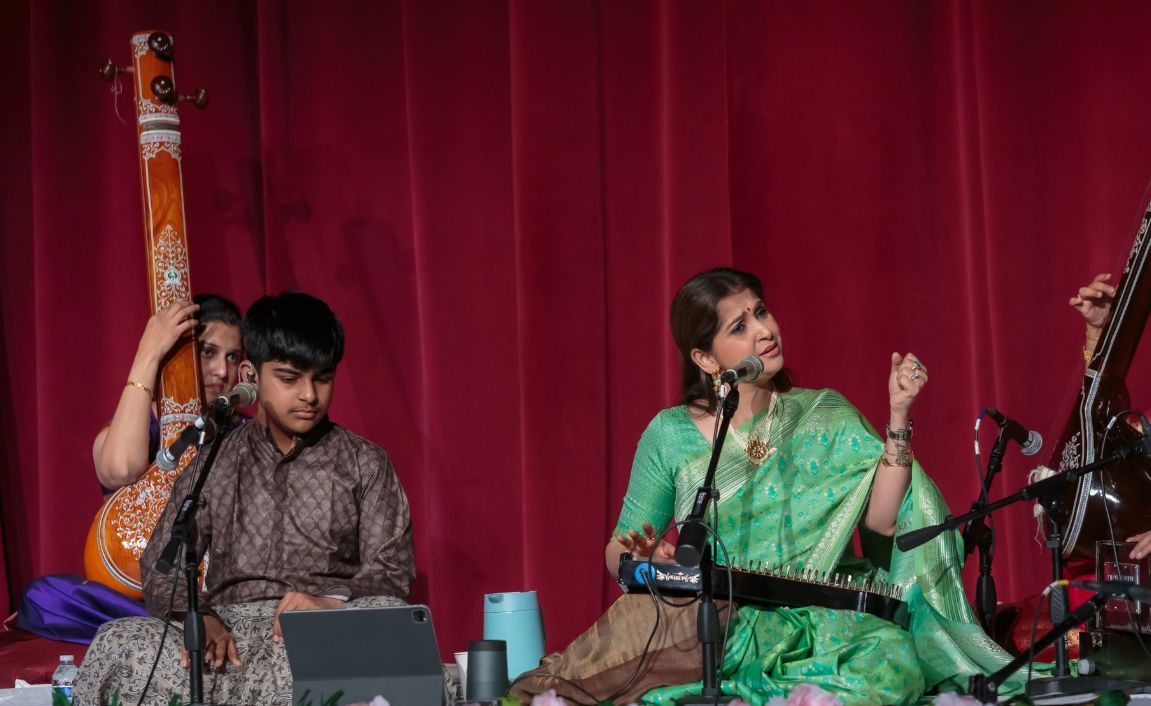 The New England Choice Awards is proud to celebrate Shadaj with the 2025 Art & Culture Visionary Award, recognizing not just a decade of music, but a decade of meaningful cultural impact.
The New England Choice Awards is proud to celebrate Shadaj with the 2025 Art & Culture Visionary Award, recognizing not just a decade of music, but a decade of meaningful cultural impact.
Q&A: Rajesh Godbole, Founder of Shadaj
INDIA New England News: Who has had the greatest influence on your personal and professional life?
Rajesh Godbole: My parents have been the greatest influence on my life. They ensured that we grew up in a culturally vibrant ecosystem. I inherited from my mother her love for music and literature. I inherited from my father his passion for math and science.
Growing up in Pune, the land of Sawai Gandharva Mahotsav, deeply shaped my sensibilities. Even if you weren’t musically inclined, the atmosphere in Pune meant classical music was part of daily life. At home, my mother used to sing, and our cassette player played the likes of Pandit Bhimsen Joshi, Kishori Amonkar, Kumar Gandharva, Kesarbai, Ustad Zakir Hussain, Pandit Ravi Shankar and many others almost constantly. Attending weekly baithaks at Bharat Gayan Samaj, Gandharva Mahavidyalaya and small private gatherings gave me a real sense of the music’s soul.
Professionally, I studied Mechanical Engineering at IIT Mumbai and I have been working in the tech industry ever since. I have been fortunate to have friends and colleagues from both technology and music world, who have been a constant source of inspiration and learning.
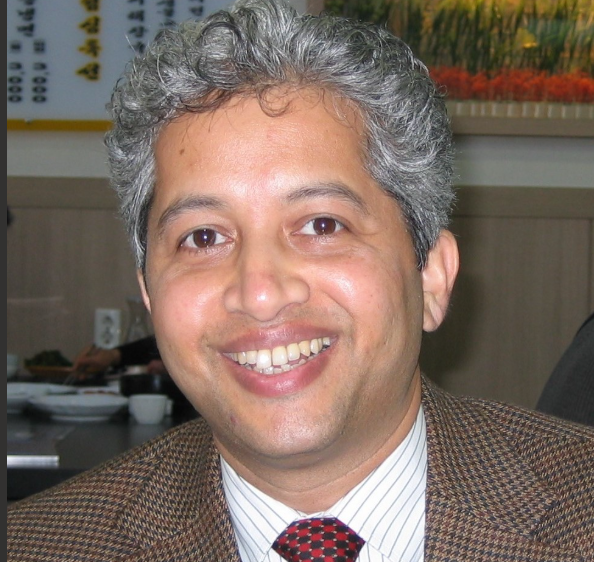
INE: What is the mission of Shadaj?
RG: Shadaj was founded to nurture and present Indian classical music in its purest and most authentic form through intimate, chamber-style concerts.
We aim to create a space where music—not paraphernalia—remains at the center, where both artists and audiences engage in an intimate, shared journey of improvisation, exploration, and experiences.
At Shadaj, we see ourselves as curators of this tradition: preserving its depth and nuances while presenting it to contemporary audiences in ways that remain true to its spirit.
INE: What have been its major accomplishments?
RG:
-
Hosted hundreds of events: Baithak concerts, community outreach events, lecture demonstrations, music appreciation sessions, and our popular Shadaj Open Mic series for local musicians.
-
During the pandemic, Shadaj became the first organization in the world to pioneer ticketed, live-streamed Indian classical music concerts giving artists a stage and audiences inspiration during difficult times.
-
A historic partnership with Lexington Public Schools and Lexington Community Education: for the first time in the U.S., Indian classical music (Tabla) is taught as part of the regular curriculum to nearly 8,000 students from diverse backgrounds across nine schools.
-
In recognition, the Governor of Massachusetts has officially proclaimed April 5, 2025, as “Indian Classical Music Day” to mark Shadaj’s 10th anniversary.
INE: Who are some of the musicians you have hosted?
RG: We have hosted maestros such as Padmabhushan Pandit Rajan and Sajan Misra, Padmashree Ustad Shahid Parvez Khan, Padmashree Pandit Venkatesh Kumar, Padmashree Vidushi Ashwini Bhide Deshpande, Vidushi Kaushiki Chakraborty, Sanjeev Abhyankar, Rahul Sharma, Rakesh Chourasia, Jayateerth Mevundi and Vidushi Aarti Ankalikar.
We are particularly proud of introducing some of the most prominent young rising stars to the audiences in the US for the first time. Some of them are Yashwant Vaishnav, Aniruddh Aithal, Bhagyesh Marathe, Abhishek Borkar and Siddharth Belmannu.
INE: What are you personally most passionate about?
RG: Music! All kinds of music. But I’m equally drawn to literature, especially Marathi literature, which has been a big part of my life. I also love cricket, chess, bridge, good films, exploring nature and have a fascination with science and mathematics.
INE: What motivates you to do the work you do?
RG: My love for the music itself is motivation enough. There’s something truly magical about witnessing artists and audiences so deeply absorbed in a captivating performance.
When an artist or audience member reminds me about a concert that is etched in their memory, it feels incredibly rewarding.
INE: Do you support or volunteer with any nonprofit or charitable causes?
RG: Yes. Shadaj proudly promotes and supports Kalkeri Sangeet Vidyalaya in India, which offers free education, food, and music training to underprivileged children. Locally, Shadaj collaborates with organizations like Lexington Community Education with the aim of reaching diverse communities. We also proudly participate in the Card to Culture program supported by the Mass Cultural Council.
INE: If you were given a second chance at a different career, what would it be?
RG: Although I studied mechanical engineering at IIT Mumbai, if given a second chance, I think I’d love to be a scientist or mathematician, who also plays music. I’m fascinated by how the rigor of scientific thinking and the creativity of music complement each other.
INE: What’s the biggest challenge you’ve overcome, and what did you learn from it?
RG: The biggest challenge has been balancing our commitment to artistic integrity with the financial realities of running a nonprofit. But this taught me that staying true to your core values, even when it comes at a cost, ultimately builds trust, credibility and a unique identity.
INE: What does “community” mean to you?
RG: Community is about shared experience and shared responsibility. I would like to see a far more diverse group of people, spanning diverse ethnic and cultural backgrounds, not limited to Indian diaspora to be part of our community of artists, volunteers, audiences and supporters.
INE: How do you define success today — has that definition evolved over time?
RG: Yes, it has evolved. In the early days, success meant simply filling the hall and avoiding losses. Today, we define success by the depth of musical experience, the diversity of our audience, and and our ability to scale and deepen our impact—whether by expanding educational programming, building lasting partnerships, or creating platforms where tradition and innovation can co-exist.


